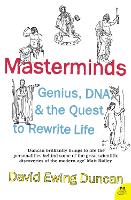


|
|
| book details |
Masterminds: Genius, DNA, and the Quest to Rewrite Life
By (author) David Ewing Duncan

|
| on special |
normal price: R 220.95
Price: R 209.95
|
| book description |
Combining myth, biography, and wit, this is a highly original depiction of cutting-edge science and its profound implications, told through the scientists who are rewriting life on earth. Throughout history, the scientists’ personalities have astonished us. From Galileo to Jonas Salk, they push and stretch society’s boundaries though their great leaps of imagination and originality, providing us with everything from the wheel to rocket ships and penicillin. Today's masterminds in biotechnology promise lifespans up to 400 years, cures for cancer, and an end to pollution. But they are also capable of causing social upheavals with Frankenstein-like nightmare creations, as well as bioweapons. Award-winning writer David Ewing Duncan has written a startling narrative about science and personality, delving into stem cells, cloning, bioengineering, and genetics by telling the stories of the characters at the fulcrum of the science. He uses a unique method of tying in age-old stories and myths – from Prometheus and Eve to Faustus and Frankenstein – to ask the question: can we trust these scientists?
| product details |

Normally shipped |
Publisher | HarperCollins Publishers
Published date | 21 Aug 2006
Language |
Format | Paperback / softback
Pages | 288
Dimensions | 198 x 129 x 20mm (L x W x H)
Weight | 230g
ISBN | 978-0-0071-6184-3
Readership Age |
BISAC | science / life sciences / genetics & genomics
| other options |
|
|
|
To view the items in your trolley please sign in.
| sign in |
|
|
|
| specials |
|
An epic love story with the pulse of a thriller that asks: what would you risk for a second chance at first love?
|
|
|

|
Mason Coile
Paperback / softback
224 pages
was: R 520.95
now: R 468.95
|
A terrifying locked-room mystery set in a remote outpost on Mars.
|
|
|
|